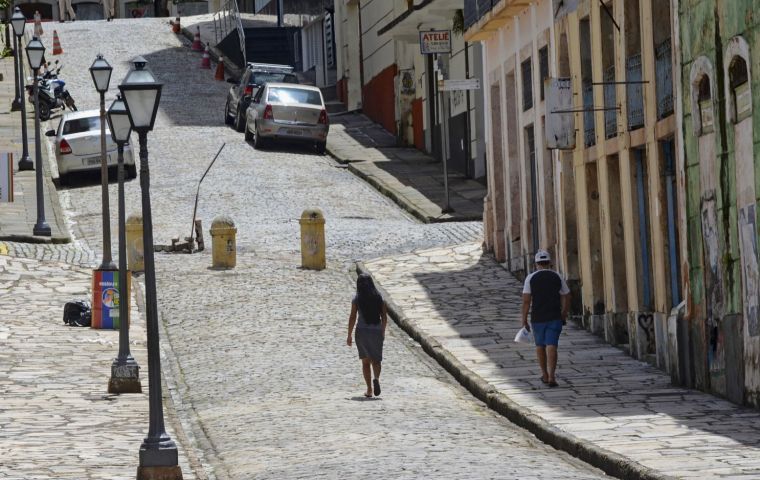MercoPress. South Atlantic News Agency
Brazilian major city begins “lockdown” on fears the virus could collapse the health service
 Tuesday's lockdown measure covers Sao Luis and parts of three other municipalities with a total population of around 1.3 million people in Maranhao. DOUGLAS JUNIOR/AP
Tuesday's lockdown measure covers Sao Luis and parts of three other municipalities with a total population of around 1.3 million people in Maranhao. DOUGLAS JUNIOR/AP Brazil's Sao Luis became the nation's first major city to begin a coronavirus “lockdown” on Tuesday, a measure that underscores widespread fears that health services across Brazil could soon collapse under the pressure of the coronavirus pandemic.
Tuesday's lockdown measure covers Sao Luis and parts of three other municipalities with a total population of around 1.3 million people in the Maranhao state. It forbids people from going outside except to obtain groceries, medication or cleaning supplies.
Maranhao - the poor, northeastern state of which Sao Luis is the capital - has not felt the brunt of the crisis, in contrast to the interior state of Amazonas, where hospitals are overwhelmed and authorities have resorted to burying victims in mass graves.
But with 4,227 confirmed cases and 249 deaths, Brazil's poorest state is still dealing with a significant caseload.
In an interview, Maranhao Governor Flavio Dino of the Brazilian Communist Party said 95% of intensive care beds in state-run public hospitals in the area under lockdown are occupied.
“We're doing a preventative lockdown,” Dino said. “We aren't dealing with chaos, but what we were observing is that demand was growing quickly and was above our expansion capacity for beds and health professionals.”
The lockdown, which lasts until May 14, was mandated by a court, but has the support of the governor. It comes as support for social and business restrictions has slipped in Brazil, as the economic impact of the pandemic raises concerns about hunger in poor communities.
Brazil is by far the hardest hit nation in Latin America, with 105,222 confirmed cases and 7,288 deaths as of Monday, according to the Health Ministry.
President Jair Bolsonaro has downplayed the virus, comparing it to “a little cold,” but the reaction of Brazil's 27 state and district governments has varied widely.
Most have imposed business restrictions of some sort, in which non-essential services and commerce are forbidden. But they have stopped short of mandating an official lockdown, which would limit people's movement. In some areas, enforcement has been spotty, and shops have remained open despite official decrees.
While Brazilians initially supported nationwide social isolation measures by wide margins, polls have showed support slowly slipping, with one late April poll showing a statistical tie between those who favor a generalized quarantine and those who favor allowing low-risk individuals to return to work.




Top Comments
Disclaimer & comment rulesCommenting for this story is now closed.
If you have a Facebook account, become a fan and comment on our Facebook Page!